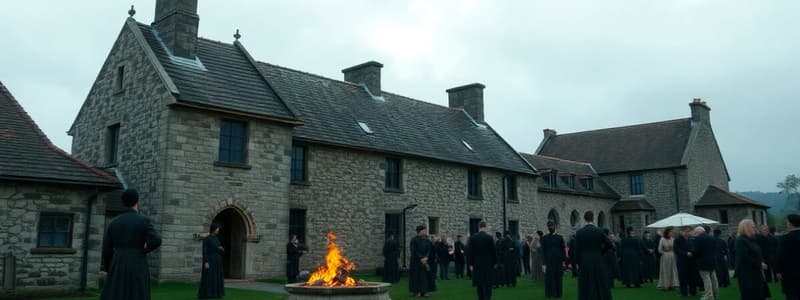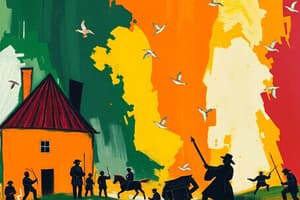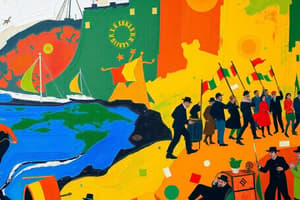Podcast
Questions and Answers
What significant change occurred in 1800 regarding the Irish Parliament?
What significant change occurred in 1800 regarding the Irish Parliament?
- It gained more autonomy from Great Britain.
- It was abolished and merged with the British Parliament. (correct)
- It was relocated to Ireland's capital.
- It expanded to include more Irish representatives.
What major event from 1845 to 1848 significantly affected Ireland?
What major event from 1845 to 1848 significantly affected Ireland?
- The passing of the Home Rule Bill.
- The establishment of an independent Irish government.
- The Great Famine leading to mass starvation. (correct)
- A successful uprising against British rule.
What was the outcome of the Home Rule Bill passed in 1914?
What was the outcome of the Home Rule Bill passed in 1914?
- It was enacted after the conclusion of World War I.
- It led to immediate self-governance for Ireland.
- It was rejected by the British Parliament.
- It was not implemented due to the outbreak of World War I. (correct)
What was established in 1922 following the war of independence?
What was established in 1922 following the war of independence?
What was a continuing issue in Northern Irish politics after partition in 1922?
What was a continuing issue in Northern Irish politics after partition in 1922?
Who is recognized as the patron saint of the island?
Who is recognized as the patron saint of the island?
What was the major religious conflict during the 16th-17th century in Ireland?
What was the major religious conflict during the 16th-17th century in Ireland?
What did Henry II of England aim to achieve when he intervened in Ireland in 1171?
What did Henry II of England aim to achieve when he intervened in Ireland in 1171?
What was the primary language of Ireland before the 12th century?
What was the primary language of Ireland before the 12th century?
What was the name given to the English-controlled area of Ireland during the English conquest?
What was the name given to the English-controlled area of Ireland during the English conquest?
What did Henry VIII proclaim himself in 1541?
What did Henry VIII proclaim himself in 1541?
What was one of the consequences of the Protestant settlement in Ireland by 1700?
What was one of the consequences of the Protestant settlement in Ireland by 1700?
What type of land ownership did Catholics typically have in Ireland during the 18th century?
What type of land ownership did Catholics typically have in Ireland during the 18th century?
Flashcards
Irish Gaelic
Irish Gaelic
The original language of Ireland, related to Scottish Gaelic.
St. Patrick
St. Patrick
The island of Ireland was converted to Christianity by him in the 5th century. He is the patron saint of Ireland.
Shamrock
Shamrock
The national symbol of Ireland, often used to explain the Holy Trinity.
The Pale
The Pale
Signup and view all the flashcards
The Plantations
The Plantations
Signup and view all the flashcards
Battle of the Boyne
Battle of the Boyne
Signup and view all the flashcards
Social-Political Division
Social-Political Division
Signup and view all the flashcards
Anglican Church
Anglican Church
Signup and view all the flashcards
Irish Act of Union (1800)
Irish Act of Union (1800)
Signup and view all the flashcards
The Great Famine (1845-48)
The Great Famine (1845-48)
Signup and view all the flashcards
Home Rule
Home Rule
Signup and view all the flashcards
Irish Free State and Republic of Ireland
Irish Free State and Republic of Ireland
Signup and view all the flashcards
Northern Ireland
Northern Ireland
Signup and view all the flashcards
Study Notes
Irish History Overview
-
Early Ireland (Before 12th Century):
-
Predominantly Celtic, speaking Irish Gaelic.
-
Converted to Christianity by St. Patrick in the 5th century.
-
Shamrock, a national symbol, associated with the Holy Trinity.
-
Politically fragmented into regional kingdoms.
-
English Influence (12th-16th Centuries):
-
Henry II intervened in Irish conflicts, claiming control in 1171.
-
English colonization focused on eastern Ireland (The Pale).
-
Most of the island remained independent.
-
The Plantations and Religious Conflict (16th-17th Centuries):
-
Henry VIII established the first Irish Parliament in Dublin and proclaimed himself King of Ireland in 1541.
-
Ireland resisted the English Reformation and remained predominantly Catholic.
-
English monarchs encouraged Protestant settlement in Ireland.
-
Protestants became the majority in Ulster by 1700.
-
Catholics faced discrimination: land ownership, political participation, and religious freedom.
-
James II's attempt to re-establish a Catholic kingdom was crushed in 1690 at the Battle of the Boyne.
-
18th Century – Deepening Division:
-
Social and political tensions between Protestants and Catholics deepened.
-
Protestants dominated land ownership and political power.
-
Catholics were restricted from holding public office or seats in Parliament.
-
The Anglican Church became the established church yet most people were Catholic
-
Irish Act of Union and Home Rule (1800-1918):
-
The 1800 Act of Union merged Ireland with Great Britain, abolishing the Irish Parliament.
-
Catholics fought for greater rights.
-
Catholic Emancipation (1829) allowed Catholics to vote and be elected to Parliament.
-
The Great Famine (1845-1848) fueled anti-English sentiment and caused mass emigration.
-
Irish nationalists demanded home rule, and resistance movements formed.
-
A Home Rule Bill passed in 1914, but WWI interrupted its implementation.
-
War of Independence between Republicans and British forces occurred from 1919
-
Divided Ireland (Since 1922):
-
Ireland was partitioned after a two-year war.
-
The Irish Free State (later the Republic of Ireland) achieved independence in 1922.
-
Northern Ireland, primarily Protestant, remained part of the UK.
-
Northern Ireland continued to elect MPs to UK Parliament. In 1998 a significant peace agreement was signed.
-
Catholic-Protestant conflict remained a significant political issue.
Studying That Suits You
Use AI to generate personalized quizzes and flashcards to suit your learning preferences.




